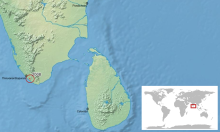Raorchestes bobingeri
| Raorchestes bobingeri | |
|---|---|

| |
| Scientific classification | |
| Domain: | Eukaryota |
| Kingdom: | Animalia |
| Phylum: | Chordata |
| Class: | Amphibia |
| Order: | Anura |
| Family: | Rhacophoridae |
| Genus: | Raorchestes |
| Species: | R. bobingeri |
| Binomial name | |
| Raorchestes bobingeri | |

| |
| Range of Raorchestes bobingeri | |
| Synonyms | |
| |
Raorchestes bobingeri (Bob Inger's bush frog) is a species of frog in the family Rhacophoridae. The species is native to India.
Etymology
The specific name, bobingeri, is in honor of American herpetologist Robert Frederick "Bob" Inger.[2]
Geographic range
R. bobingeri is endemic to the Western Ghats of India.[3][4] It has been observed between 1,030 and 1,300 meters (3,380 and 4,270 feet) above sea level.[1]
Habitat
R. bobingeri lives in trees in primary and secondary forests. It has been observed at former logging sites but does not otherwise tolerate habitat disturbance.[1]
Conservation status
Scientists classify R. bobingeri as "Near Threatened" because of its relatively large, nonfragmented range. The frog lives in three protected parks: Kalakad Mundanthurai Tiger Reserve, Ponmudi Reserve Forest, and Peppara Wildlife Sanctuary.[1]
Original description
- Biju, S.D.; Bossuyt, F. (2005). "Two New Philautus (Anura: Ranidae: Rhacophorinae) from Ponmudi Hill in the Western Ghats of India". Copeia. 2005 (1): 29–37. doi:10.1643/CH-04-194R1. S2CID 62792108. Retrieved 16 August 2023. (Philautus bobingeri, new species).
References
- ^ a b c d IUCN SSC Amphibian Specialist Group (2022). "Bob Inger's Bush Frog: Raorchestes bobingeri ". The IUCN Red List of Threatened Species. 3.1. p. e.T58917A166108519. doi:10.2305/IUCN.UK.2022-2.RLTS.T58917A166108519.en. 58815. Retrieved 16 August 2023.
- ^ Beolens, Bo; Watkins, Michael; Grayson, Michael (2013). The Eponym Dictionary of Amphibians. Exeter, England: Pelagic Publishing. xiii + 244 pp. ISBN 978-1-907807-41-1 (Hbk). (Raorchestes bobingeri, p. 102).
- ^ Frost, Darrel R. "Raorchestes hassanensis (Biju and Bossuyt, 2005)". Amphibian Species of the World, an Online Reference. Version 6.0. American Museum of Natural History, New York. Retrieved 16 August 2023.
- ^ "Raorchestes bobingeri (Biju and Bossuyt, 2005)". AmphibiaWeb. University of California, Berkeley. Retrieved 16 August 2023.

